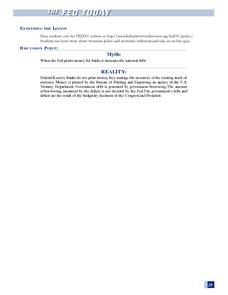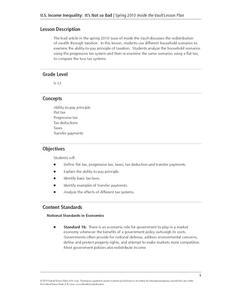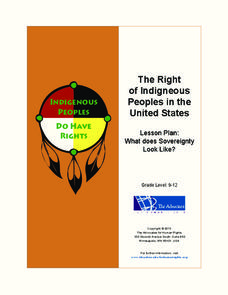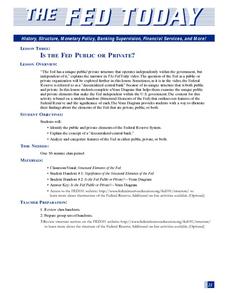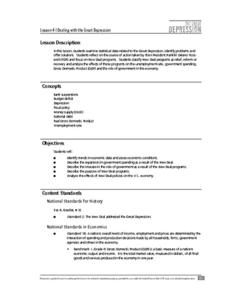Advocates for Human Rights
Civic Engagement and U.S. Immigration Policy
To conclude their study of immigration and human rights, class members create a civic engagement project centered on an issue of immigration and designed to influence US immigration policy. They examine examples of attempts to influence...
College Board
Civic Knowledge and Action in AP U.S. Government and Politics
Vote, it's your civic duty! The high school instructional activity focuses on voter turnout and civic participation with a series of activities. Young scholars analyze data to discover voter turnout trends, complete worksheets, and...
C-SPAN
Foreign Interference in U.S. Elections
With election security looming large for 2020, pupils decide what should be done to protect them from foreign interference. A series of videos, including interviews with national security officials, elected representatives, and experts...
Constitutional Rights Foundation
Federal Policy and Immigration
How is federal policy established? To gain insight into this complex and often messy process, class members read an article that uses information on attempts to establish public policy in immigration to illustrate the role proposed...
Federal Reserve Bank
The Fed's Role in Making and Setting Monetary Policy: Part 2
How does the Federal Open Market Committee work to formulate the nation's monetary policy in the United States? As the second segment of a lesson on the role of the Fed in setting monetary policy, class members will learn about open...
Federal Reserve Bank
U.S. Income Inequality: It's Not So Bad
What is the difference between a flat tax, progressive tax, tax deduction and transfer payments? Pupils examine the ability-to-pay principle of taxation through discussion, problem solving, and a variety of worksheets on topics from US...
K20 LEARN
Allotment in Indian Territory: Land Openings in Indian Territory
To understand how the allotment policy embedded in the Dawes Act, passed by the U.S. government in 1887, affected the tribal sovereignty of Native Americans, young historians examine various maps and documents and Supreme Court cases...
Constitutional Rights Foundation
Special Order 40
The city of Los Angeles' 1979 Special Order 40 states: "LAPD officers shall not initiate police action with the objective of discovering the alien status of a person." After reading a fact sheet that details the history of Special Order...
Constitutional Rights Foundation
Guest-Worker Program
The U.S. Guest-Worker Program and the H-2A visa are the focus of a social studies activity. First, class members assume the role of advisors who must present the president with four proposals that would amend the visas given to...
Advocates for Human Rights
The Right of Indigneous Peoples in the United States
The sovereignty of U.S. Native American nations is the focus of a resource that asks class members to compare the Right to Self-Determination in the UN Declaration on the Rights of Indigenous Peoples with a fact sheet that details the...
National Endowment for the Humanities
Lesson 2: The United States, France, and the Problem of Neutrality, 1796–1801
While the French Revolution could be considered inspired by the American Revolution, it created thorny problems for the new United States. Should the United States get involved and be drawn into a European drama? Was the US strong...
iCivics
A Very Big Branch
Through detailed secondary source reading material and an interactive "true/false" activity, learners discover the depth and complexity of the executive branch in the United States government. Topics covered include executive...
State Bar of Texas
Baker v. Carr
Can the federal government override the state government to protect the citizens of the United States? The 1962 Supreme Court case Baker v. Carr outlines the issue of equal protection under the law. Scholars investigate with a short...
National Endowment for the Humanities
Lesson 1: The United States Confronts Great Britain, 1793–1796
After the Revolutionary War, the success of the United States was far from guaranteed. Foreign powers coveted the new land, and Great Britain challenged American sovereignty. Learners consider the challenges facing the new nation using...
NPR
Same-Sex Marriage
The battle over same-sex marriage is a prevalent issue in the United States, and a valuable topic to be discussed in your social studies classroom. Here is a basic outline of introductory questions, focus questions, vocabulary, and media...
National Institute on Drug Abuse
The Brain's Response to Drugs
Marijuana affects the brain differently than inhalants, which have a different effect than opioids. Elementary and middle school classes read about these drugs as well as nicotine, methamphetamine, hallucinogens, and steroids before...
Federal Reserve Bank
Is the Fed Public or Private?
The Federal Reserve System as a decentralized central bank can be a difficult concept for learners to grasp. Help them get a firm handle on this concept using this resource, in which class members work as a group to identify the...
Federal Reserve Bank
Dealing with the Great Depression
As part of their study of the Great Depression, young economists examine statistical data to determine the effectiveness of FDR's New Deal recovery programs.
Constitutional Rights Foundation
Educating About Immigration The DREAM Act
Group members role play state legislators, supporters of and opponents to the The DREAM Act (Development, Relief, and Education for Alien Minors). After listening to the arguments put forth for and against the immigration legislation,...
University of Wisconsin
Analyzing Presidential Campaign Propaganda
Campaign propaganda has evolved from 1952 through the presidential election of 2008. A social studies activity prompts class members to analyze the devices used in ads and political cartoons, noting strategies they believe would work to...






